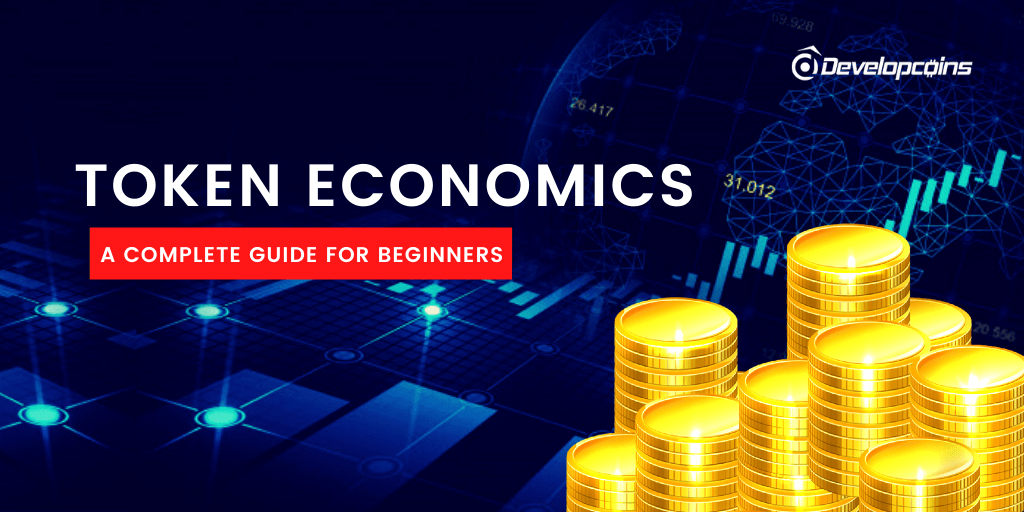

A guide to help you understand what is token economics and how it can be used by industries. You've probably encountered a definition of tokenomics here!

Whenever you entering on the crypto space, surely, you’ve probably heard the word like "tokenomics or token economics" Yes, most people tend to involved in token-based projects because it ensures the investment and enhances the growth of the potential business.
“What is Token Economics or Tokenomics and How does work?” - this blog is going to tell you everything you need to know about one of the world’s most exciting crypto model. Shall we begin?
Let’s start at the very beginning, the best place to start…
The word "tokenomics" is a mixture, of the words "token" and "economics" and it is a comparatively new term which makes huge popularity in the crypto world. A token can be used in multiple ways and may incentivize folks to join, remain, and provide to an ecosystem, and to use, hold or spend tokens frequently.
Tokenomics is the science of the token economy. Essential to building an active token community that drives adoption which covers all aspects involving a token’s creation, analyze a token, functionality, utilization, distribution and you should find its purpose. Consideration of token economics can go by a way of helping you determine the merits of a given project.
If crypto-based projects are able to profitably leverage token economics principles to grow a group of communities, the tokens will have a better chance of success. It covers all things like total supply and how tokens are distributed. While entering to token economics structure, it isn’t just applicable to token issuers – it’s also highly relevant to crypto traders. Tokenomics terms provide key indicators of success for a given crypto project and crucial info for any trader.
Developing a token economy is one of the most important parts of a fundraising model like ICO, STO, IEO and more. A good token economics business model can assure the long-term growth of a blockchain startup, although a bad token economics model can extremely impact the viability and the investment potential of a business.
The three primary solutions of token economics:
These tokens are able to fulfill any solution, and it is highly available that we are only beginning to see the potential in the token economy.
Every ecosystem is together of several factors, and the token functions as the central element of this new type of economy.
As you might know, a token is a digital asset that can belong to various categories:
We break down each of these concepts below., as these are important terms in token economics.
Utility Token - A utility token has an immense functionality than a coin. Utility tokens do have value, but they cannot be treated as a crypto coin. Utility tokens can provide profit to investors in multiple ways. They give users utilize to a future of product or service.
Mostly, a tech startup develops an online product or service and initiates an ICO. Over the ICO, the company sells utility tokens. Investors can purchase these tokens and use them as a means of payment on the platform developed by the releasing company.
Explore here - What is utility token & benefits (Step-by-step guide)
Security Token - Security tokens are security given to the investors, to encourage accredited investors to raise capital. Security token offerings (STOs) combines the features of ICO and IPO, in order to provide a perfect balance by getting capital at low cost while abiding by the compliance of securities laws. A security token holder will get certain ownership rights and become a stakeholder of the company.
Explore here - Security Token Offering Benefits & Services!
Fungible Token - Fungibility is the necessary feature of digital currency, as it makes it interchangeable, divisible into units, and able of storing value. Fungibility is an attribute found in Bitcoin, ZCash, Ether and any ERC20- based tokens. If you send someone 1 Bitcoin, Ether or Zcash, and get one back, you wouldn’t notice any difference. The value is the same, indifferent of its provenance.
Non- Fungible Token - It can’t be replaced by another similar token. It is unique and non-interchangeable.
Explore here - Fungible Token vs Non-Fungible Token (step-by-step guide)
For an ICO/STO, the term hard cap specifies to the upper limit on the number of tokens that can be sold. It discloses to the maximum amount of funds the development team is willing to collect in exchange platform for their tokens during that starting stage of funding.
So if the hard cap is reached during an ICO fundraising campaign, the tokens are considered as sold out for that particular round.
A soft cap stands for the minimum amount of money a crypto startup needs to raise, through an ICO/IEO, in order to successfully follow their roadmap and create a viable product.
Token supply means a given number of tokens. The number of tokens is fixed, it is the total number of tokens that have been (or will be) created. This number is decided before the first toke is ever created. Some of the projects may have a high total token supply, while the token supply of others may be more restricted.
The term circulating supply refers to the number of tokens that are publicly available and circulating in the market. The circulating supply of tokens can increase or decrease over time.
It refers to the coins that are accessible to the public and should not be confused with the total supply or max supply.
The token price is the amount in fiat or BTC, ETH, or another currency that needs to purchase one token.
Analyzing a token price that sets a project up for success is a key part of any crypto project, and it can be described by taking the total allocation of tokens for a given sale and dividing it by the hard cap for the project.
The market cap of crypto is the price per token increased by the number of tokens in circulation (circulating supply, not total supply).
Compatibility can be a sign of the likelihood of success for some token projects, as it shows the degree to which a given platform is compatible with industry standards.
Fund allocation assigns to the number of funds distributed to the general public as part of a token sale. In common, less than 80% of tokens being allocated for public use is a lively indicator of success.
Token projects that require detailed KYC (know your customer) information from customers' side to accepting their registration for a token sale are almost evenly more reliable than projects that don’t do the same due diligence.
This shows the amount of inflation that project owners have developed into their projects. Token inflation of any kind is generally negative for any investor, as it poses a high risk of token value dilution for retail investors in the long term.
Still, token economics is an emerging topic of crypto space and it offers outstanding opportunities for analysts and investors alike to checkout every token project’s potential for success.
If you are looking for a solution provider or advisor capable of providing the right guidance in token economics then Developcoins is the right place!
Developcoins is a leading token development company in the world that provide tokenize solutions for all business sectors. Our pool of team consists of developers, designers, financial business experts, accountants and advisors whose skills are all necessary to provide the best advice and assist with a broad range of services.
Our team will walk through token development space and explain token business models and discuss what's happening in the world of ICOs/STOs and tokens today. And we will answer your questions about your token project, ICO, STO and more. Join us to know about the exploding world of blockchain tokens! Feel free to consult with our experts at Whatsapp | Telegram